Uncategorised
UPDATE:DeadSocial (version 2) is currently being peer reviewed and tested.
We announced the DeadSocial (version 2) at the Digital Legacy Conference 2018 in New York. Since then have been testing and tweaking the service and think that you are going to love it! Until the next version is ready register for early access and view our other resources.

James from DeadSocial presenting at Click Summit 2018, Lisbon Portugal
Register for early access
As featured in...
Learn from our resources by clicking here
Writing Your Advance Care Plan
Advance care plans are a set of directions and future decisions about future care. They are often written when healthy and only take effect when we lose capacity of our body or mind. An 'Advance Care Plan' can help ensure that you are not given treatment that you do not wish to receive and that your family have power to act on your behalf if you wish them to.
- An basic Advance Care Plan (aka Advanced Decision) template can be downloaded here.
- A detailed Advance Care Plan template can be downloaded here
Key principles of Advance Care Planning Process (by the National Council For Palliative Care)
The process of creating an Advance Care Plan is voluntary. No pressure should be brought to bear by the professional, the family or any organisation on the individual concerned to take part in writing an Advance Care Plan (ACP)
- ACP must be a patient centred dialogue over a period of time
- The process of ACP is a reflection of society’s desire to respect personal autonomy. The content of any discussion should be determined by the individual concerned. The individual may not wish to confront future issues; this should be respected
- All health and social care staff should be open to any discussion which may be instigated by an individual and know how to respond to their questions
- Health and social care staff should instigate ACP only if in the context of a professional judgement that leads them to believe it is likely to benefit the care of the individual. The discussion should be introduced sensitively
- Staff will require the appropriate training to enable them to communicate effectively and to understand the legal and ethical issues involved
- Staff need to be aware when they have reached the limits of their knowledge and competence and know when and from whom to seek advice
- Discussion should focus on the views of the individual, although they may wish to invite their carer or another close family member or friend to participate.
- Some families may have discussed their issues and would welcome an approach to share this discussion
- Confidentiality should be respected in line with current good practice and professional guidance
- Health and social care staff should be aware of and give a realistic account of the support, services and choices available in the particular circumstances. This should entail referral to an appropriate colleague or agency when necessary
- The professional must have adequate knowledge of the benefits, harms and risks associated with treatment to enable the individual to make an informed decision
- Choice in terms of place of care will influence treatment options, as certain treatments may not be available at home or in a care home, e.g. chemotherapy or intravenous therapy. Individuals may need to be admitted to hospital for symptom management, or may need to be admitted to a hospice or hospital, because support is not available at home
- ACP requires that the individual has the capacity to understand, discuss options available and agree to what is then planned. Agreement should be documented
- Should an individual wish to make a decision to refuse treatment (advance decision) they should be guided by a professional with appropriate knowledge and this should be documented according to the requirements of the MCA 2005.
"Many people find that working through an advance care plan is a good way to think about what would be important to them if their health was to change in a way which was well considered rather than rushed. In this way it can allow you to think about more of the aspects of what makes you you, and what is important to you, than you’re sometimes able to do if your health deteriorates quickly and have to make decisions quickly." - Palliative Care In Wales (source)
Once you have written your Advance Care Plan it is important that you save it in a secure and safe place
Further resources
- Securely storing your Will, Advance Care Plan etc
- Writing your Will
- Writing your Social Media Will
- Passing on your passwords
- Creating a bucklet list
- Becoming an Organ Donor
- Support Organisations & Charities

Overview
It is extremely important to keep your last will and testament and other end of life documents in a safe place. It may sound very patronising to make this statement however important documents and files are increasingly being lost due to poor digital death planning. To store your files safely both in the virtual and real word you need to tell someone where they are kept. By telling someone you instantaneously make the location a much safer place for them to reside in.
The 'storing your will and your important documents' guide
We have outlined a number of different options for storing your important documents below. We hope that these help ensure that your last will and testament and your end of life wishes are adhered to. If you have any suggestions as to how this process could be improved please do get in touch.
1. Print out / save hard copies of your will and your end of life wishes
 We strongly recommend that you dust off your printer and print anything saved digital that gives directions as to what your end of life wishes are.
We strongly recommend that you dust off your printer and print anything saved digital that gives directions as to what your end of life wishes are.
In today’s ever digitised world you may be inclined to do everything online and only save it on your computer or in the cloud. If you have written a will online you will need to print and sign it in front of two witnesses who are not beneficiaries to make it legally binding. When carrying out this task we recommend that you should print at least three versions of each document.
For legally binding documentation (such as your Last Will & Testament) again print it at least three times and sign each document accordingly. If you have photos and videos that you would like to be passed down in a accessible format you may want to print some of your photos and/or burn a DVD that contains some of your video files.
If you would like to pass down the photos and videos in a high quality you may want to take them to your local photo printers. These include Boots (online and in store) in the UK and Wallmart (online and in store) in the USA.
2. Save hard copies of your documents in safe places
Now that you have three copies of each document you should save them in the following locations:
- In your home. Dedicate a suitable box or draw to keep these important documents safe. Now tell someone where your assigned location is).
- Provide a copy to your documents to your assigned executor(s). This may be a family member, your partner or a close friend.
- If you decide to use a solicitor you may want to leave a copy of your documents with them. There may however be a cost for both you and those left behind if you do use a solicitor. We recommend that you request all storage costs to be sent to you (in writing) before you appoint them to carryout any tasks in the future.
3. Save copies digitally
Saving copies of your important documents, files, photos and videos digitally can make life a lot easier on those you leave behind. You should have a offline copy for most of your important files (this may not be the case for password documentations and other regularly updated documents).
To create a digital copy of your Last Will and Testament, your funeral wishes etc you may need to ‘scan’ and save the original document. If you do not have a scanner you may want to download a scanner application for your iPhone or Android. This will allow you to (kind of) scan your important documents and email to yourself a copy of them (as a PDF).
4. Saving your important folders on your computer
Saving a copy of your important documents on your computer or laptop can be a good idea however this can create security issues if the documentation is sensitive (especially if the computer is used by other friends and relatives). Furthermore, if you use a password for your computer or you encrypt specific files that store your documents
If you do save your important documents in a folder on your computer you will need to tell someone both the password to your computer and the assigned password for your encrypted folder (if you decide to encrypt the folder).
- Encrypting files and folders on your computer
- How to encrypt a folder on a Windows PC or Laptop
- How to encrypt a folder on a Mac

5. Saving copies of your files and folders on an external hard drive
External hard drives can be a great way to store and then share your important documents and files. If you plan to pass down a large number of media files (like photos and videos) this can be a easy way to do so.
Most external hard drives that you can purchase today connect to all laptops computers and macs. You may want to purchase one or more external hard drives and transfer your end of life wishes, important files, folders, documents photos and videos over to the storage device. Once transferred simply give the external hard drive to your executor, family member or solicitor.
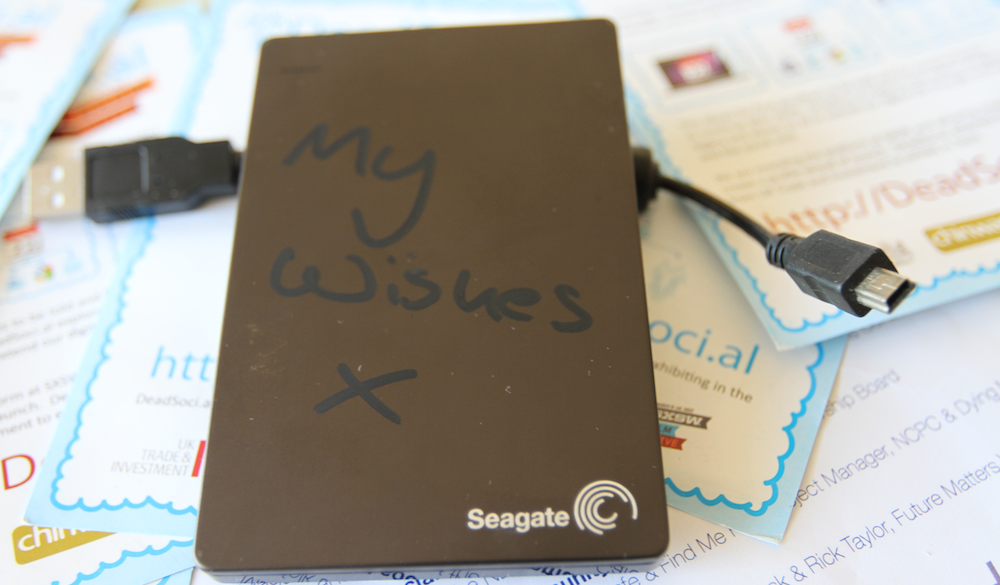
6. Virtual depository boxes (saving documents in the cloud)
Warning: There are an increasing number of ‘online vaults’ that will ‘look after' your legacy (normally at a monthly cost). The solutions that we have reviewed do not make life easier for you or your loved ones. In many circumstances they fragment your content and make things harder for those left behind. If you are planning to save your important files ‘in the cloud’ we recommend that you carryout he following tasks beforehand:
- Keep a digital copy of your files on a designated area on your computer (as highlighted above)
- Keep a digital copy of your files on an external hard drive. (as highlighted above)
- Which online storage vault / locker / cloud solution to use?

If you save your files in the cloud do not pay to do so. The free amount of storage offered by ‘Google Drive’ or 'Dropbox' should be enough for most people to store their end of life documents and files in. If you use Google Drive or Dropbox ‘share’ the relevant folder(s) containing your files and documents immediately.
Some services may state that they add further value as yourimportant documents will not be released until after your death. If you would like some of your files not to be seen until after your death we recommend asking an accredited solicitor to carryout this task for you instead. The cost of a solicitor to carryout this task will probably be less than the monthly charges accumulated by services with a monthly subscription. It may be ironic for us to state this but "just because a process can be carried out online it doesn't necessarily mean that it will be better, easier or cheaper.
7. Saving files on your own your own personal cloud
In the last couple of years the ‘home cloud’ (or connected home) has started to become a popular solution for the home. In short Hard drives (such as the WD My Cloud shown below) connect to the internet connection in your home. When a device (like the WD My Cloud) is connected to the internet you are able to access the files it it on all all your internet enabled devices.
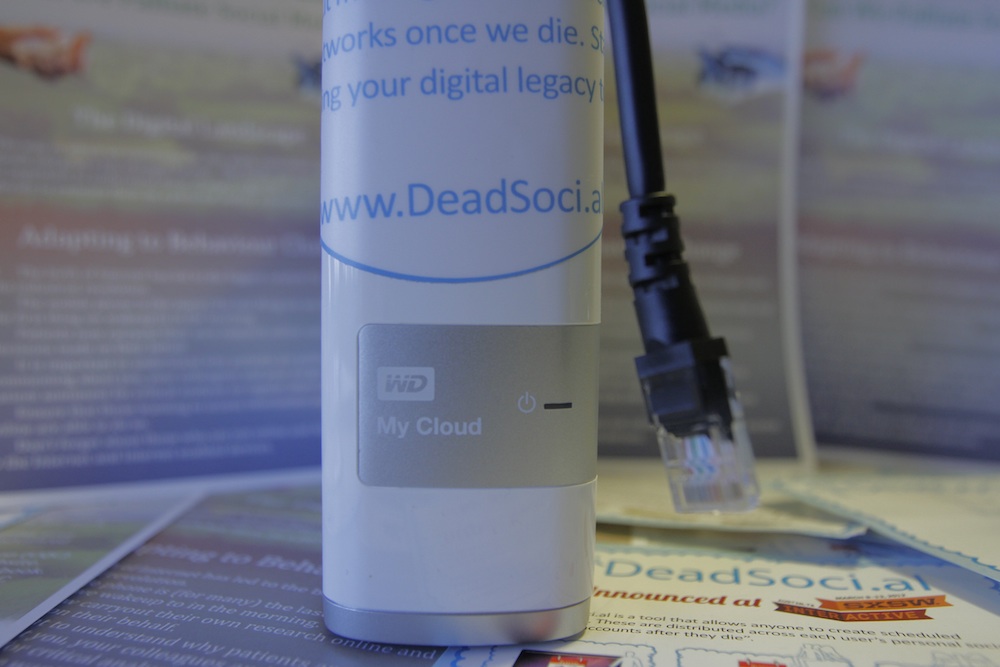
We believe that home cloud services can be great solutions for storing and sharing documents like our last will and testament, media files etc. Home cloud services may however be slightly more challenging to setup. As with all cloud storage solutions, we recommend that you have a hard copy of your important documents printed and kept in a secure location.
8. Keeping your passwords in a safe place
If you use online services you may have noticed that the service providers request that your password is changed on a regular basis. This can be confusing and very hard to manage. For further advice on managing your passwords click here. There is not however a 'best way' to manage your passwords due to the different ways in which we use different services, the number of services we each use, our relationship with our executor, the state of our health etc.
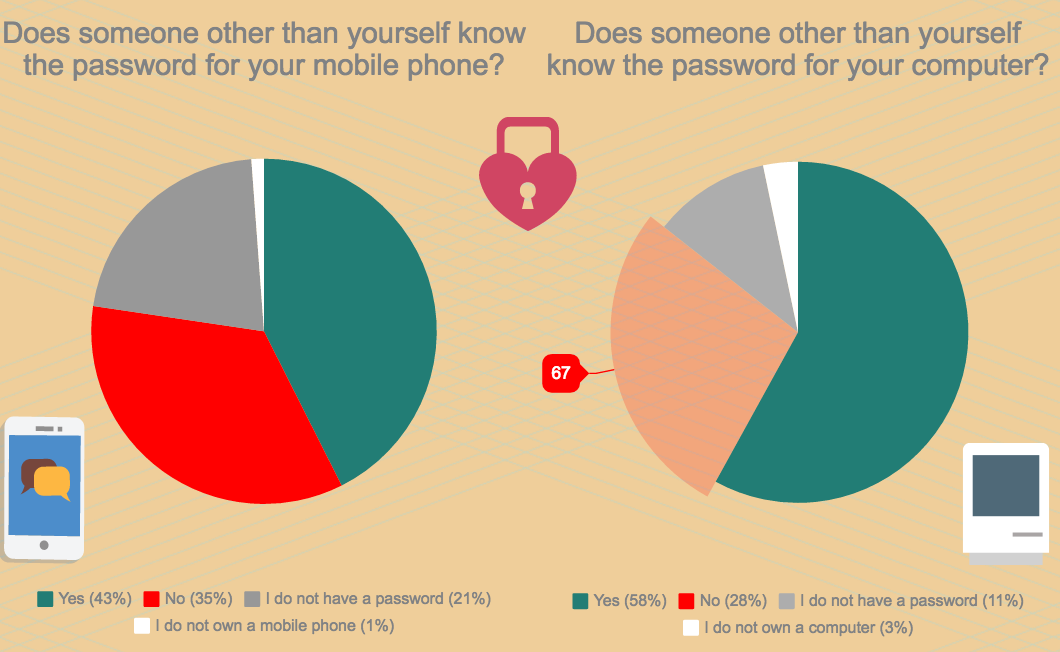
(Data from the The Digital Legacy and Digital Assets Infographic 2016)
9. Backup your data and media from your social networks
You may also want to download and save your photos, videos, messages, tweets etc from your social media sites. Simply follow the tutorials below and save them in your preferred location(s).
- How to download your data from Facebook
- How to download your data from Twitter
- How to download your data from Instagram
If no instructions are given about what to do with someones website once they die you may want to carryout the following:
- Speak to other friends and family about what the deceased may have wanted.
- Find out if the website / blog is self hosted (paid for) or hosted for free.
- If the website is self hosted make sure that the hosting is paid for to ensure that it remains live.
- Create a backup of the deceased's website or blog using a free tool called 'Site Sucker'. To read a tutorial on how to do this by click here.
- Ensure sure that the deceased's URL (website address) and hosting is paid for. Generally speaking (paid for) hosting is paid for each month and the URL will beed to be renewed every two years.
- If you do not know who the URL was registered through you may want to use the tool 'WhoIs' to find out. Simply add the URL into the search box https://who.is
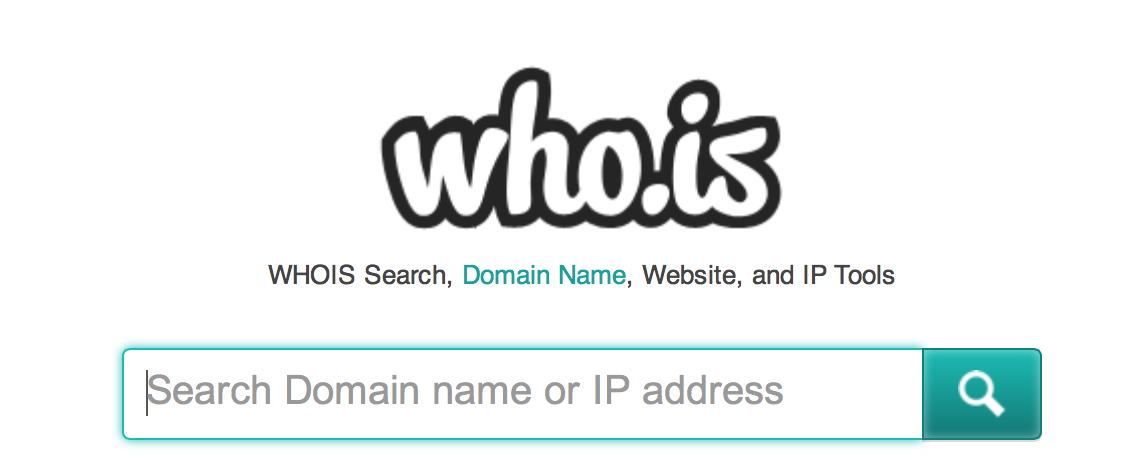
- Try and find out the username and password for the website. Once attained you or a friend will be able to update the website on the deceased's behalf. Tasks may incude sending out a blog post stating that the website author has died and/or updating the website's design, content management system etc.
What to do if a website by the deceased has been removed
If you are trying to access the website of the deceased and it no longer appears we recommend that you first use 'WhoIs' and contact the hosting provider. If the website or blog has been permanently removed you may want to view the 'Internet Archive' to see if a copy of it still exists. https://archive.org/index.php. If a copy does exist you can then use SiteSucker to create a backup on your own hard drive to ensure that it is preserved. To read a tutorial of how to backup a website using SiteSucker click here.
 Overview
Overview
Many of us now have business and personal websites and blogs. If someone you care about has died and they didn't make any plans prior to death for their website or blog you may be interested in using a tool called 'SiteSucker' to pull the content off of their website and create a copy. This will not be published online however if the deceased's hosting stops or their blog is removed you will still have access via a hard copy.
Before continuing however you may want to:
- Find out if any wishes were left regarding the deceased's website and/or blog
- Find out who hosts the current website (and take any relevant actions in regards to transferring ownership etc).
How to download a copy of a website or blog using SiteSucker.
SiteSucker copies a website's HTML documents, images, backgrounds, movies, and other files to your local hard drive. it is currently only available on mac. It can be purchased for $4.99 here http://www.macupdate.com/app/mac/11634/sitesucker
If you are using a Windows computer you may find a suitable similar solution by searching online
Now enter a URL for the website that you would like to create a copy of (for example www.DeadSocial.org) and click 'return' and a copy of the pages will start to be saved onto your computers hard drive.
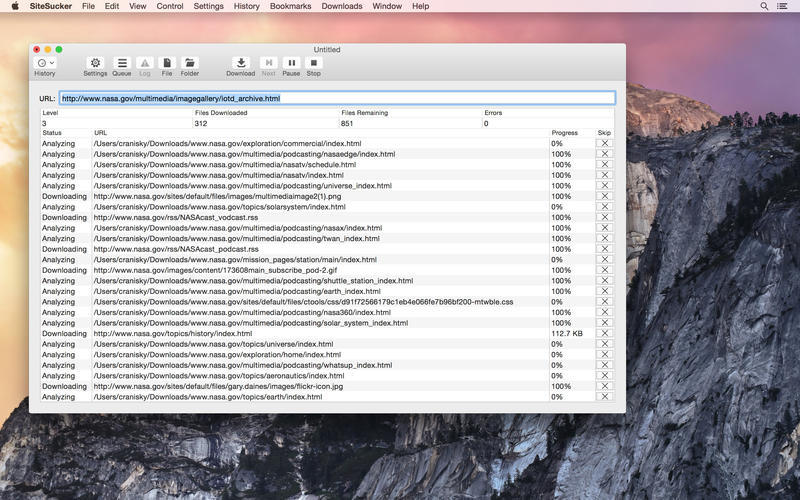
If you own your own website and/or blog you may find the following tutorial of interest: What do you want to happen to your website or blog when you die?

